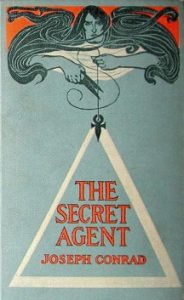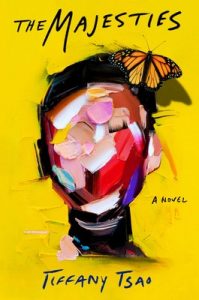As a reader, I love a good hook. So when it came to writing my own novel, The Majesties, a mass murder-suicide seemed the logical way to start. In the opening chapter, Gwendolyn Sulinado wakes up in a hospital bed to find out her sister, Estella, has poisoned three hundred of their closest family and friends at their tycoon grandfather’s birthday banquet. As the sole survivor, comatose Gwendolyn searches her memories to figure out why the person she most loved would want her and their entire family dead.
Family: the people we’re supposed to know best. With whom we share an unbreakable bond. Whom we’re practically obligated to love. Surely you can trust your sibling not to be a serial killer and your offspring not to off you, right? But The Majesties plumbs the depths of just how much you might not know about your closest kin. It’s also a novel about how the love we feel for people—even those related to us—may hinge on blissful ignorance about who they really are.
After all, if the saying is true, familiarity breeds contempt. Perhaps it’s a minor miracle that your family, acquainted with all your shortcomings and sins, not to mention your most irksome habits, hasn’t throttled you yet. Or maybe they’re plotting to—and who better to lay the groundwork for your demise than those most acquainted with your weaknesses?
But enough talk about death by family. Let’s talk about the death of others. Here are five tales featuring family murdering family, or family members who end up murdering someone else.

The Brothers Karamazov by Fyodor Dostoyevsky
The classic patricide novel. As radically different as Dmitri, Ivan, Alyosha, and Smerdyakov are from one another, they have one thing in common: they share a father, the lecherous and drunken but wealthy Fyodor Pavlovich Karamazov. A father so abusive and irresponsible that he’s all too easy to hate. So it’s little wonder, perhaps, when he’s found dead one day with his head bashed in. A trial is held to discover which of his sons is the murderer, and confusion ensues because, as it turns out, it’s complicated. This novel is much more than a murder mystery. It’s an immensely long murder mystery crammed with intense theological and philosophical discussions and dilemmas.

My Sister, the Serial Killer by Oyinkan Braithwaite
Korede receives a call and finds out that her sister, Ayoola, has killed a man. Again. Using her expertise as a nurse, she masterminds the disposal of the body. Again. At first our sympathies lie entirely with Korede. The annoyingly gorgeous and narcissistic Ayoola seems to expect that her responsible older sister will literally help her get away with murder every time. But as the plot thickens, so does our understanding of the tragic and violent past that binds the sisters together. Powerfully feminist and masterfully deadpan, Braithwaite’s novel will keep you spellbound until the last breath. I mean, line.

The Secret Agent by Joseph Conrad
A bleak novel about a lazy, incompetent spy. After years of living undercover as a “shopkeeper” (read: pornography seller) in London, Verloc is finally mobilized by his government—the country is never named, but it’s totally Russia—to commit a terrorist act. His mission is to blow up the Royal Observatory. But instead of placing the bomb himself, he enlists his intellectually disabled brother-in-law, Stevie, to do so. When Stevie trips en route, he sets off the bomb and is instantly killed. A police investigation follows, sending Verloc into a panic. But Verloc’s unintentional murder of Stevie isn’t the only death by loved one that occurs. Unrelentingly dark and cynical, this book leaves no illusions or ideals intact by its grim end.

Ghost Wall by Sarah Moss
“…people don’t bother to hurt what they don’t love. To sacrifice it.” So teenage Sylvie says to her new friend as they weather the ordeal of a several-day reenactment of Iron-Age Northumbrian life. Sylvie has been forced to come along by her Ancient-Britain-obsessed father. As the novel unfolds, the extent of her father’s control and the violent means by which he disciplines her become painfully clear. When the desire to make the reenactment more real grows stronger among the group’s men, Sylvie’s father offers to stage the ultimate sacrifice, in line with the ancient custom of surrendering one’s nearest and dearest to the bog.

“The Believer” from Drifting House by Krys Lee
Jenny returns home from seminary to find a boy’s arm in the sink and his torso protruding from the garbage bin. In the corner her mother squats, shivering, a bloody saw in hand. After her murderous mother is institutionalized in a ward for the criminally insane, Jenny and her father fall apart—as does Jenny’s faith in God, who used to be everywhere to her, but not anymore. In this story, as in all the collection’s stories, Krys Lee’s prose is compassionate and precise, gently slicing open your heart like a surgeon’s scalpel. It’s why Drifting House is one of my favorite books of all time.
* * *


















